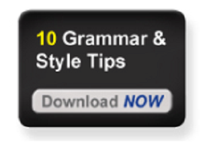 Whether to use who or whom confounds a lot of people. The basic rule is easy enough, but even the most seasoned editors and writers can stumble over sentences like the following:
Whether to use who or whom confounds a lot of people. The basic rule is easy enough, but even the most seasoned editors and writers can stumble over sentences like the following:
Think about who you want to cover and who is eligible for coverage.
Part of the problem is that the sentence sounds perfectly natural. And in fact, in everyday conversation, it’s fine. But in more formal contexts and to be grammatically correct, that first who should be whom.
Below we share three tricks for how to figure out whether who or whom is correct.
Trick No. 1
The commonly repeated advice for remembering whether to use who or whom is this: If you can replace the word with he or she or another subject pronoun, use who. If you can replace it with him or her (or another object pronoun), use whom. One way to remember this trick is that both him and whom end with the letter m. So, for example:
[Who/Whom] do you love? Do you love him? You wouldn’t say, “Do you love he?” So whom is correct (sorry, Bo Diddley).
[Who/Whom] writes the songs. He writes the songs. You wouldn’t say, “Him writes the songs.” So who is correct.
This device also works when we parse the first example at the beginning of this post:
Think about [who/whom] you want to cover. Think about whether you want to cover him. So whom is correct.
Think about [who/whom] is eligible for coverage. Think about whether he is eligible for coverage. So who is correct.
Trick No. 2
If the first trick doesn’t work for you, try this one:
- Find all the verbs in the sentence.
- Find the subject that corresponds to each verb.
- If who/whom is a subject (the one doing the action), use who.
- If who/whom is an object (the one receiving the action), use whom.
Let’s look at our first example: Think about who you want to cover and who is eligible for coverage.
- The verbs are in orange: think, want and is.
- The subjects are in green: you (implied), you and who.
- Because the second who is the subject of the last clause, who is correct.
- Because the first who is not a subject, it must be an object (i.e., it’s receiving the coverage), so whom is required: Think about whom you want to cover.
Trick No. 3
This trick is really a variation on No. 2. If written explanations of subject and object pronouns — or of grammar generally — make your head throb, a more visual approach might help.
Here’s our original sentence: Think about who you want to cover and who is eligible for coverage.
Let’s break it down to what it’s really asking:
| Two Things to Think About | |
| Who you want to cover | Who is eligible for coverage |
Because both items are objects of the person’s thoughts, the tendency is to want to use whom based on the subject = who and object = whom reasoning above.
But you need to look at each object as a whole to determine how who/whom functions in that clause BEFORE analyzing how each clause functions in the sentence.
Here’s a visual way to do that. In each clause, underline the subject and highlight the verb. If who/whom is underlined, use who. Any instances of who/whom that remain are the object, so use whom for those. Returning to our example:
| Two Things to Think About | |
| Whom you want to cover | Who is eligible for coverage |
***
Let us know in the comments below whether these tricks are helpful, or feel free to share your own!




